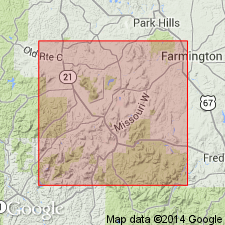
- Usage in publication:
-
- Breadtray granite
- Modifications:
-
- First used
- Dominant lithology:
-
- [Granite]
- AAPG geologic province:
-
- Midcontinent region
Summary:
Breadtray granite (new) of Bevos group (new). Also spelled Bread Tray. Briefly summarized in reports by W.C. Hayes, p. 8 (strat. column), 81, 82, 83 (table 1), this volume. New names are credited to Tolman and Robertson (in prep.) [1969, Missouri Div. Geol. Survey Water Res. Rpt. Inv., no. 44 (Contrib. to Precambrian Geol., no. 1)]. Age is Precambrian.
Occurs in St. Francois Mountain area. Bread Tray Mountain is in St. Francois Co., southeastern MO.
Source: Modified from US geologic names lexicon (USGS Bull. 1350, p. 89).
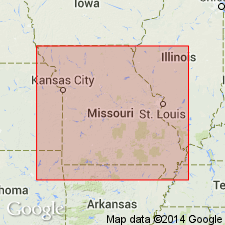
- Usage in publication:
-
- Breadtray granite
- Modifications:
-
- Principal reference
- Dominant lithology:
-
- Granite
- AAPG geologic province:
-
- Midcontinent region
Summary:
Pg. 40. Breadtray granite of Bevos group. A light-red, fine- to medium-grained granophyric kali-granite or kali-alaskite. Contains a predominance of red potash feldspar and quartz. Characteristically weathers to form small spheroidal to subangular, dull brownish-red boulders that have deeply etched surfaces. Correlates with Graniteville granite and Brown Mountain rhyolite porphyry, both of Bevos group. Overlies Butler Hill granite of Bevos group; contact is gradational. Exposed in St. Francois Mountains, southeastern Missouri; typical exposures from just west of Doe Run, St. Francois Co., south to Roselle, Madison Co., southeastern MO. Formed during later phase (of 2) of batholithic intrusion. Appears to have differentiated in place; was last of batholithic rocks of St. Francois Mountains to differentiate. Age is Precambrian.
Named from exposures on Bread Tray Mountain, in sec. 1, T. 34 N., R. 4 E., St. Francois Co., southeastern MO.
See C.E. Robertson, 1995, Precambrian rocks, IN T.L. Thompson, Stratigraphic succession in Missouri (revised-1995), Missouri Division of Geology and Land Survey, 2nd series, v. 40 Revised, p. 5-14.
Source: Strat. succession in Missouri (Thompson, 1995, p. 12); GNU records (USGS DDS-6; Denver GNULEX).
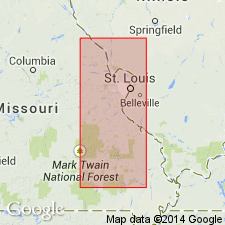
- Usage in publication:
-
- Breadtray Granite
- Modifications:
-
- Geochronologic dating
- AAPG geologic province:
-
- Midcontinent region
Summary:
Reports a U-Pb zircon age of 1495 +/-20 Ma and Rb-Sr whole-rock/mineral separates age of 1308 +/-40 Ma. Rb-Sr ages on some rocks are consistently younger than U-Pb ages, probably due to removal of Sr from the rock. Age of most rocks studied is about 1500 Ma, but a real event occurred about 1300 Ma as recorded by Rb-Sr. Sample localites in St. Francois Mountains, southeast Missouri (Midcontinent region).
Source: Modified from GNU records (USGS DDS-6; Denver GNULEX).
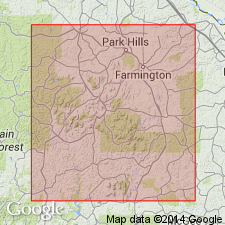
- Usage in publication:
-
- Breadtray Granite
- Modifications:
-
- Geochronologic dating
- AAPG geologic province:
-
- Midcontinent region
Summary:
See also M.E. Bickford, 1976, Missouri Geol. Survey Rpt. Inv., no. 61, p. 149-154. Reports a U-Pb zircon age of 1500 +/-20 Ma and Rb-Sr whole-rock age of 1289 +/-69 Ma. The approx. 220 m.y. age difference between the two measurements is much greater than statistical errors at 95 percent confidence. It is believed that U-Pb age is the most reliable because of less analytical scatter and more consistent results. Rb-Sr ages are probably younger than U-Pb ages due to loss of Sr from the rock. Sample localites in T. 35 N., R. 4 and 5 E., and T. 34 N., R. 4 and 5 E., St. Francois County, St. Francois Mountains, southeast Missouri (specific locations listed in Appendix 3). Analytical data in Appendices 2 and 4.
Source: Modified from GNU records (USGS DDS-6; Denver GNULEX).
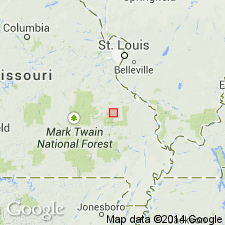
- Usage in publication:
-
- Breadtray Granite†
- Modifications:
-
- Abandoned
Summary:
†Breadtray Granite abandoned as a formal lithodemic unit [though not specifically stated] in St. Francois Mountains, southeastern MO, Midcontinent region. Tolman and Robertson (1969) had thought that Butler Hill pluton was made up of two separate granites: Butler Hill and Breadtray Granites. Breadtray now thought to be a fine-grained facies of Butler Hill Granite and is referred to as Breadtray facies of Butler Hill Granite.
Source: GNU records (USGS DDS-6; Denver GNULEX).
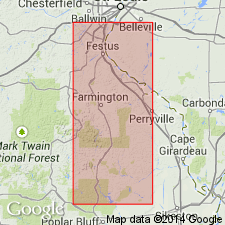
- Usage in publication:
-
- Breadtray Granite
- Modifications:
-
- Revised
- AAPG geologic province:
-
- Midcontinent region
Summary:
Breadtray Granite (referred to in table 1 as "Butler Hill-Breadtray Granites"), one of seven Precambrian Y plutonic rock units assigned to the /St. Francois Mountains Intrusive Suite (revised). [Previously assigned to Bevos Group by Tolman and Robertson (1969); status of Bevos not discussed.] Present in St. Francois Mountains, southeast Missouri (Midcontinent region). Oldest plutonic rocks in the area; older than "Slabtown-Stono Granites" (revised) of St. Francois Mountains. Age is Precambrian Y. Nomenclature listed in table 1.
[Conflicts with nomenclature guidelines (ACSN, 1970; NACSN, 1983, 2005, 2021): name St. Francois Mountains applied concurrently to two different units in same area.]
Source: Modified from GNU records (USGS DDS-6; Denver GNULEX).
For more information, please contact Nancy Stamm, Geologic Names Committee Secretary.
Asterisk (*) indicates published by U.S. Geological Survey authors.
"No current usage" (†) implies that a name has been abandoned or has fallen into disuse. Former usage and, if known, replacement name given in parentheses ( ).
Slash (/) indicates name conflicts with nomenclatural guidelines (CSN, 1933; ACSN, 1961, 1970; NACSN, 1983, 2005, 2021). May be explained within brackets ([ ]).

